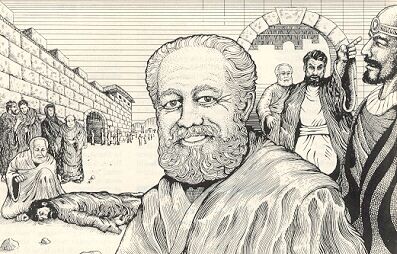 We
read that in the first days of the Church, the multitude of believers had but
one heart and one soul; and none said that anything which he possessed was his
own. (Acts 4:32) Amid this fervent company of Christians who practiced
evangelical poverty, one only is singled out by name, Joseph, a rich Levite from
Cyprus. He, having land, sold it, and bringing the price, laid it at the feet of
the Apostles. They then gave him a new name, Barnabas, son of consolation. He
was a good man, full of the Holy Spirit and of faith, and was soon chosen for an
important mission, the rapidly growing Church of Antioch. Here he perceived the
great work which was waiting to be done among the Greeks, and therefore he
hastened to seek out and bring Saint Paul to Antioch, from his retirement at
Tarsus.
We
read that in the first days of the Church, the multitude of believers had but
one heart and one soul; and none said that anything which he possessed was his
own. (Acts 4:32) Amid this fervent company of Christians who practiced
evangelical poverty, one only is singled out by name, Joseph, a rich Levite from
Cyprus. He, having land, sold it, and bringing the price, laid it at the feet of
the Apostles. They then gave him a new name, Barnabas, son of consolation. He
was a good man, full of the Holy Spirit and of faith, and was soon chosen for an
important mission, the rapidly growing Church of Antioch. Here he perceived the
great work which was waiting to be done among the Greeks, and therefore he
hastened to seek out and bring Saint Paul to Antioch, from his retirement at
Tarsus.When the prophet Agabus at Antioch foretold a great universal famine, Barnabas and Paul were selected by the faithful, to take to the Church of Jerusalem their generous offerings for the poor of that city. It was also at Antioch that the two Saints were named for the apostolate of the Gentiles; and they sailed together for Cyprus and then to the cities of Asia Minor. Their preaching struck men with amazement, and some cried out, “The gods have come down to us in the likeness of men!?calling Paul Mercury, and Barnabas Jupiter. The Saints traveled together once again, to the Council of Jerusalem, and told of the “signs and wonders which God had wrought among the Gentiles?during their missionary journey. Shortly after this they separated; Barnabas with John Mark went to Cyprus, while Paul with Silas returned to Asia Minor.
The tradition of Milan, Italy, reveals that Saint Barnabas went from Cyprus to Italy, and in Milan founded its church; he is still honored there as its first bishop. After seven years he consecrated Saint Anathalon to replace him, and returned to Cyprus to visit the churches. He crisscrossed the island several times to bring to every city and village the Holy Name of the Son of God. In Salamis, some of the recalcitrants plotted together to kill him. He was aware of the conspiracy; nonetheless, after foretelling to John Mark that he would die that same day, he went to the synagogue to preach as usual. It was there that he was stoned as a blasphemer, in the year 61 of our era. Saint John Mark succeeded in burying him near Salamis.